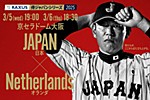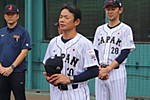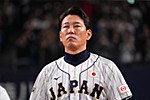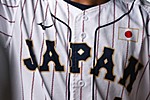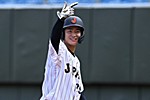The All-Star Series, held this year for the first time since 2006, which invited the MLB all-star team to Japan, has ended. The Samurai Japan Top Team played a total of six games, including friendship games, and succeeded in coming ahead with 4 wins and 2 losses. This has become a significant series to the fledgling Kokubo Japan, formed to reclaim the world number-one position in three years.
Japan's forte of pitching shone throughout this series. In the first game, Kenta Maeda (Hiroshima), with abundant experience in international competitions, held the opponents scoreless for five innings. Next, in the second game, Chihiro Kaneko (Orix) pitched five innings while only allowing three runs, and kept the MLB batting line in check with three hits allowed and five strikeouts. The third game was even more of a sight. Takahiro Norimoto (Tohoku Rakuten), in his first game with Samurai Japan, pitched five perfect innings with six strikeouts, his pitches centering on fastballs just like the regular season. From the sixth inning on, the pitchers were Yuki Nishi (Orix), Kazuhisa Makita (Saitama Seibu), and Yuji Nishino (Chiba Lotte), and while they did allow walks and hit batsmen, they all finished the game without allowing a hit, accomplishing a complete no-hitter. This is the first time in the All-Star Series that Japan has thrown a no-hitter. This has demonstrated that the pitching power that has left results in past international tournaments is still the same as ever.
The offensive line scored a total of 22 points in the six games, including the friendship games. While only three of these were home runs, their base-running mentality of always going for the next base stood out, headed by Yuki Yanagita (Fukuoka SoftBank) and Ryosuke Kikuchi (Hiroshima) as first and second hitter in almost all the games. Even from the member selection stage, the team policy was centered on players who could not only hit, but also run and defend. With these results, we can look forward to a perfected Samurai Japan team in the future.
A future issue for Samurai Japan is that Shintaro Fujinami (Hanshin), who started the fourth game, and Shohei Otani (Hokkaido Nippon-Ham), the two right-handed pitchers that were expected to shoulder the next generation of Japanese baseball, both had trouble locating, and suffered a loss for two games straight. Likewise, the batting lineup only scored one point apiece in games 4 and 5. In game 5 particularly, the MLB starting pitcher Shoemaker kept them to two hits in five innings. Shoemaker had been marked from the first game, in which he pitched several strong innings, only allowing two runs in five innings. They have also swallowed the bitter pill of defeat to this ""Japan killer"" in past tournaments such as the WBC. They are still seeking a countermeasure for if they encounter the same pitcher in the short term.
In this series, the problems regarding differences in game balls or hardness of the mound, which has often become the subject of debate in past international games, appear to have been dealt with in a way that they did not affect the performance of any player. There were many players making their debut in this series, and they provided stable results. Perhaps pursuing their perfection in the training game scheduled next fall, and continuing to show the ""strength"" in the international competition scheduled for next autumn, will lead to ""reclaiming the world number-one position"".
2014 SUZUKI ALL-STAR SERIES














